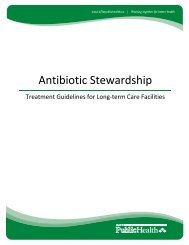Genital Warts - KFL&A Public Health
Genital Warts - KFL&A Public Health
Genital Warts - KFL&A Public Health
You also want an ePaper? Increase the reach of your titles
YUMPU automatically turns print PDFs into web optimized ePapers that Google loves.
What is HPV?<br />
<strong>Genital</strong> Human Papillomavirus (HPV) Infections<br />
<strong>Genital</strong> <strong>Warts</strong><br />
Human Papillomavirus (HPV) is one of the most common sexually transmitted infections<br />
(STI). Up to 70 percent of people will have at least one HPV infection in their lifetime. There<br />
are more than 130 different strains (types) of HPV, 40 of which can be transmitted to the<br />
genital area. HPV types are classified as high risk (which can cause cervical and other<br />
cancers) or low risk (which can cause genital warts).<br />
How do you get HPV?<br />
HPV is spread by skin-to-skin contact with an infected person. This means that you do not<br />
need to have penetrative sex (sex where the penis is inserted into the mouth, vagina, or<br />
anus) to get it. Any contact in the genital area or skin around the genitals can potentially<br />
transmit HPV.<br />
How would I know if I have genital warts?<br />
If a person is infected with a low risk HPV strain that causes genital warts, they might see<br />
one or more skin coloured bumps that can vary in size and shape. <strong>Genital</strong> warts are typically<br />
described as “cauliflower-like.” In men, genital warts are often found in or around the anus<br />
and penis. Women may have genital warts on the cervix, vagina, vulva, or anus. Sometimes<br />
genital warts will cause itching or bleeding.<br />
Can genital warts be treated or cured?<br />
There are effective treatments. <strong>Genital</strong> warts can be treated with either self or doctor applied<br />
treatments. The self-applied treatments (such as Imiquimod cream or Podofilox solution) are<br />
prescribed by a doctor and can be put on at home. The most common treatment used by<br />
a health care provider is called liquid nitrogen. The genital area is very sensitive and so a<br />
doctor or nurse must apply the treatment to avoid any damage to the area.<br />
Individuals with genital warts may have recurrences and may require multiple treatments<br />
however; most HPV infections will eventually resolve and clear.<br />
What are the risks of not receiving treatment for genital warts?<br />
The majority of HPV infections clear up on their own. However, for some people if HPV<br />
infections are left untreated, the warts may continue to grow and spread. Treatment can<br />
also reduce the number of recurrences that someone might have. It is very important that<br />
people with genital warts abstain from any sexual activity until the lesions are gone to prevent<br />
spreading the infection to partners.<br />
... over
What can I do to prevent genital warts?<br />
• Always use a latex condom when you have oral, anal and vaginal intercourse. Although condoms do not<br />
cover the entire area of skin around the genitals, they are the best form of prevention.<br />
• Limit the number of sexual partners that you have.<br />
• Consider getting vaccinated against HPV. The HPV Gardasil vaccine protects against four common strains<br />
of the virus, two which lead to most cases of cervical cancer and two which lead to most cases of genital<br />
warts. In Canada, Gardasil has been approved for females and males between the ages of 9 and 26 years<br />
of age.<br />
If you have any questions, call KFL&A <strong>Public</strong> <strong>Health</strong> at 613-549-1232 or 1-800-267-7875, ext. 1275.<br />
FS 109<br />
Rev. 28/06/11<br />
page 2
















